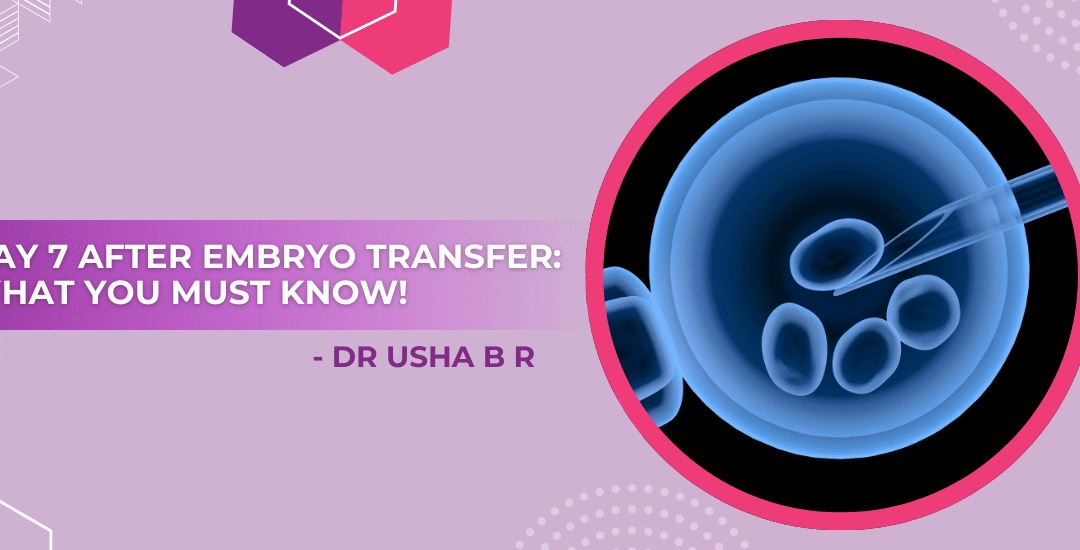The days following embryo transfer are filled with hope and anticipation. 7 days after embryo transfer marks a crucial point in your IVF journey. Whether you’re experiencing cramping, spotting, or bloating, understanding what symptoms are normal during this time can help alleviate anxiety and guide your next steps. In this blog, we’ll explore the most common symptoms, when to seek medical advice, and what to expect in the days leading up to your pregnancy test.
Is it normal to have cramping or spotting 7 days after embryo transfer?

Yes, cramping and spotting are common 7 days after embryo transfer. These symptoms can occur as part of the embryo implantation process, which happens when the embryo attaches to the uterine lining. The cramping can feel like mild menstrual cramps, and some women might experience spotting, often referred to as implantation bleeding 7 days after embryo transfer. This bleeding is typically light and can be brownish or pinkish in color, lasting only a short period.
If the bleeding is heavier or accompanied by severe cramping, it’s essential to reach out to your gynecologist for further evaluation. However, if it’s mild, don’t worry—these symptoms are often part of the normal process.
What could be the possible causes of bloating or mild discomfort after embryo transfer?
Bloating and mild discomfort are common 7 days after embryo transfer, and they may stem from several sources:
- Hormonal Changes: Progesterone is a key hormone used during IVF to support pregnancy. While it’s essential, it can lead to side effects such as bloating, constipation, and mild abdominal discomfort.
- Embryo Implantation: The embryo’s attachment to the uterine lining can cause mild cramping or pulling sensations. This is part of the implantation process and is generally short-lived.
- Digestive Changes: Hormonal fluctuations may slow down digestion, leading to bloating, indigestion, or mild abdominal discomfort. These symptoms typically resolve on their own.
- Stress and Anxiety: The emotional stress of waiting for pregnancy confirmation can contribute to feelings of discomfort. Try to stay relaxed and focus on self-care during this period.
What should I do if I don’t feel any symptoms 7 days after embryo transfer?
It’s understandable to worry if you don’t feel any symptoms 7 days after embryo transfer, but it’s important to remember that every pregnancy is different. Some women don’t experience noticeable symptoms, while others may experience mild signs. Early pregnancy signs 7 days after embryo transfer can be subtle, so try not to overthink it.
If you’re feeling anxious, track any changes in your body, but avoid jumping to conclusions. Lack of symptoms doesn’t necessarily mean the transfer was unsuccessful. If you’re feeling uncertain, it’s always a good idea to reach out to your doctor for reassurance.
Is it normal to take a pregnancy test 7 days after embryo transfer, or should I wait longer?

While it’s tempting to take a pregnancy test 7 days after embryo transfer, it’s usually recommended to wait longer. Pregnancy tests detect the hormone hCG, but 7 days after embryo transfer might be too soon for hCG levels to be high enough to give an accurate result. Taking a test too early could result in a false negative.
For the most reliable results, it’s best to wait 10-14 days after embryo transfer before testing. Alternatively, your doctor will likely perform a blood test to confirm pregnancy. These tests are more accurate than home tests and can provide a clearer picture.
Frequently Asked Questions:
What are the symptoms 7 days after embryo transfer?
Common symptoms include mild cramping, spotting, bloating, and fatigue. However, some women may not experience any symptoms at all. 7 days after embryo transfer symptoms can vary from person to person.
What causes spotting after embryo transfer?
Spotting is often a sign of implantation, where the embryo embeds itself in the uterine lining. Implantation bleeding 7 days after embryo transfer is common and typically appears as light, brownish or pinkish discharge.
Is cramping after embryo transfer normal?
Yes, cramping is normal and can be caused by implantation or hormonal changes. If the cramping is severe or accompanied by heavy bleeding, seek medical advice from your gynecologist in Jayanagar.
When should I take a pregnancy test after embryo transfer?
It’s best to wait at least 10-14 days after embryo transfer to take a pregnancy test to avoid false negatives. Your doctor will usually advise when the right time is to test for the most accurate results.
Why do I feel fatigued after embryo transfer?
Fatigue is a common symptom during early pregnancy and after IVF procedures. The body is adjusting to hormonal changes, which can make you feel more tired than usual.
What causes bloating after embryo transfer?
Hormonal treatments, especially progesterone, can cause bloating and mild abdominal discomfort. Fatigue after embryo transfer 7 days can also contribute to this sensation.
What should I do if I don’t feel any symptoms 7 days after embryo transfer?
The absence of symptoms doesn’t mean something is wrong. Every woman’s experience is different, and the lack of symptoms doesn’t necessarily indicate an issue. If you’re concerned, consult your doctor for reassurance.
Reference Links:
Understanding IVF Success Rates: How Your Embryo Transfer Affects the Outcome
What You Should Know About IVF and Fertility Treatments
These links are now properly formatted and ready for use. Let me know if you’d like any further modifications!

